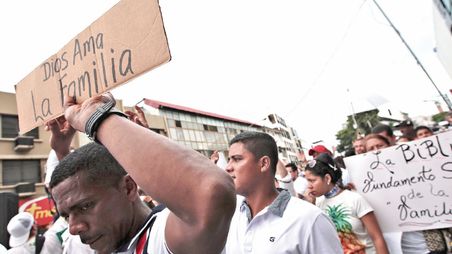Panamanians trust the church

Panama is the second country in Latin America that relies the most on the Church as an institution.
Paraguay (82%) is the country that trusts the Church the most, then followed by Panama (78%), then Honduras (75%), Venezuela (74%) and Brazil (73%) according to Latinobarómetro.
This, despite the fact that the study concludes that confidence in the institution, in the whole region, has dropped 10 percentage points in the last 10 years, a phenomenon influenced by pedophilia scandals in the Catholic Church involving priests and bishops .
But that feeling does not seem to have impacted Panama . In 2017, 72% of Panamanians said they trust the Church, and this year, the believers in it increased six points: 78%.
Why?
Historically, the analysis adds, it is the countries of Central America that trust the Church the most, while those of the Southern Cone are the least. There are other internal events that could explain the phenomenon.
The survey was conducted between June 2 and August 2, 2018, when the country is preparing to host the World Youth Day (WYD) , to be held in January, and both the Government, authorities Catholic ecclesiastics and civil society have undertaken a noisy campaign aimed at having citizens host pilgrims in their homes.
During these days, the political-Church binomial also gravitates. The attempt to create the Independent Social Alternative Party, which brought together several evangelical organizations, as a platform to reach a quota of power in 2019, could have also had an impact. Its activists managed to collect at least 35 thousand signatures. However, the attempt failed because a ruling by the Electoral Tribunal determined that at least 511 people were tricked into signing.
For the study, available at www.latinobarometro.org, 20 thousand 204 face-to-face interviews were applied in 18 Latin American countries, between June 15 and August 2, 2018, with representative samples of the population of each nation (between one thousand and one thousand 200 cases), with a margin of error of around 3% per country. The study itself reveals that 2018 is a year in which political and social economic indicators fall, some of which reach the most negative figures since the beginning of the measurements in 1995.
Another aspect that could affect the increase of trust in the Church is the projects in which different religious groups have agreed: against the law of sexual education in schools, and in opposition to marriage between two people of the same sex . The rejection of these issues has manifested itself with massive marches in the streets.
All these circumstances under the mandate of Juan Carlos Varela , educated in a Jesuit school and that has given important financial contributions to the Catholic churches.
